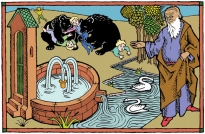Texte controversate în Vechiul Testament
Acest curs analizează texte controversate ale Bibliei Ebraice pentru teologia iudeo-creștină din punctul de vedere al cititorului contemporan. Textele menționate au jucat deseori - nu numai în discursul contemporan, dar pe tot parcursul istoriei hermeneuticii Vechiului Testament - un rol important în procesul de a contesta relevanța și normativitatea Vechiului Testament pentru gândirea creștină și modernă. Cursul relevă istoria interpretării ale acestor texte și caută cheia hermeneutică prin care aceste texte își pot păstra legitimitatea în canonul bisericii creștine și chiar dincolo de acesta.
Competențe
Competențe specifice
Confruntarea studentului cu textele problematice din Vechiul Testament ajută la dobândirea unei viziuni nuanțate față de literatura veterotestamentară. Studentul va dezvolta o atitudine hermeneutică critică în legătură cu texte biblice.Competențe generale
Prin confruntare cu situații critice din Vechiul Testament, studentul își dezvoltă o atitudine nuanțată față de situații care diferă în comparație cu cea obișnuită. Studentul va fi capabil să ia atitudine critică față de poziții diferite în legătură cu o anumită problemă.Structura cursului
Distribuția fondului de timp
| Număr de ore pe săptămână | Curs | Seminar | Practică | |
|---|---|---|---|---|
| 2 ore/săptămână | 2 | 0 | 0 | |
| 28 ore/semestru | 28 | 0 | 0 | |
| Studiu individual | Ore/sem | |||
|---|---|---|---|---|
| Timpul total estimat | 88 | |||
| Studiul după manual, suport de curs, bibliografie și notițe | 40 | |||
| Documentare suplimentară în bibliotecă, pe platformele electronice de specialitate și pe teren | 20 | |||
| Pregătire seminarii, teme, referate, portofolii și eseuri | 0 | |||
| Tutoriat | 0 | |||
| Total studiu individual | 60 | |||
Examinare
Scopul examinării este evaluarea abilităților de rezolvare a problemelor complexe în cazuri concrete. Examenul scris are o formă de test cu 4-5 texte biblice, având ca temă subiectele discutate în cadrul cursurilor. Pe baza studiilor de caz, studentul își dă dovadă că înțelege complexitatea problemei în pericopa biblică respectivă, poate reflecta critic asupra aspectelor critice din acel text, și propune o soluție exegetică / hermeneutică, bazându-se pe informațiile și metodologiile însușite în cadrul cursului urmat și din bibliografia aferentă.
Bibliografie
Articol în revistă
- (2013): Az Ószövetség (meghatározó) szerepe a református igehirdetésben, avagy: Kell-e nekünk az Ószövetség, s ha igen, mit kezdjünk vele?. In: Igehirdető 24.6, pp. 243-252
- (2010): Megbánó Isten - változó Isten. Az ószövetségi teológia korlátairól és lehetőségeiről. In: Studia Doctorum Theologiae Protestantis 1., pp. 9-31
- (1998): Isten megbánása. In: Református Szemle 91., pp. 5-11
- (1992): "The Glory of Israel Does Not Deceive or Change His Mind". On the Reliability of Narrator and Speakers in Biblical Narrative. In: Prooftexts 12., pp. 201-212
- (2008): Wenn Gott seine Meinung ändert... Ungewohnte Rede von Gott. In: Bibel und Kirche 63.1, pp. 18-21
- (1988): The Repentance of God. A Key to Evaluating Old Testament God-Talk. In: Horizons in Biblical Theology 10., pp. 47-70
- (2019): Exkluzivizmus, intolerancia és az Ószövetség világa. In: Studia Doctorum Theologiae Protestantis 10., pp. 21-40
- (2014): „Örül az igaz, mikor látja a bosszút, mikor lábát a gonoszok vérében mossa.” Az úgynevezett bosszúzsoltárok a נקם szemantikájának fényében. In: Református Szemle 107.5, pp. 605-642
- (2005): Vergeltung oder Schadensersatz? Erwägungen zur regulativen Idee alttestamentlichen Rechts am Beispiel des ius talionis und der mehrfachen Ersatzleistung im Bundesbuch. In: Evangelische Theologie 65., pp. 459-477
- (1992): The Psalms of Vengeance against Their Ancient Near Eastern Background. In: Journal of Northwest Semitic Languages 18., pp. 1-11
- (1999): Kollektivschuld? Der Gedanke übergreifender Schuldzusammenhänge im Alten Testament und im Alten Orient. In: Zeitschrift für Altorientalische und Biblische Rechtsgeschichte 5., pp. 193-222
- (2012): Teremtés és születés. A Zsoltárok 139:13-16 antropológiai kérdései. In: Studia Doctorum Theologiae Protestantis 3., pp. 9-36
- (2012): Schöpfung und Geburt. Anthropologische Begrifflichkeit in Psalm 139,13-16. In: Sacra Scripta 10., pp. 147-176
- (2011): Noțiuni la antropologia Psalmului 139:13. In: Cercetări Biblice 5., pp. 19-30
Carte
- (1997): Die Reue Gottes. Aspekte alttestamentlicher Gottesvorstellung. Biblisch-Theologische Studien . Neukirchen-Vluyn: Neukirchener Verlag, pp. 200
- (2009): Der bewegliche Gott. Eine Untersuchung des Motivs der Reue in der Hebräischen Bibel. Herders Biblische Studien 61. Freiburg: Herder, pp. 592
- (1995): The vengeance of God. The Meaning of the Root NQM and the Function of the NQM-Texts in the Context of Divine Revelation in the Old Testament. Oudtestamentische Studiën 31. Leiden: Brill Academic Publishers, pp. 331
- (1998): Ein Gott der Rache?. Freiburg: Herder, pp. 188
- (2009): Collective and Individual Responsibility. A Description of Corporate Personality in Ezekiel 18 and 20. Studia Semitica Neerlandica 53. Leiden: Brill Academic Publishers, pp. 288
- (1981): Corporate personality in ancient Israel. Edinburgh: T & T Clark, pp. 64
- (2010): Yahweh and Moses in Conflict. The Role of Exodus 4:24–26 in the Book of Exodus. Bible in History 8. Bern: Peter Lang, pp. 230
- (2011): Is God a Moral Monster? Making Sense of the Old Testament God. Grand Rapids: Baker Books, pp. 252
Articol în carte
- (2009): The Uncertainty Principle of Repentance in the Books of Jonah and Joel In: Angel, Hayyim: Revealed Texts, Hidden Meanings: Finding the Religious Significance in Tanakh . Jeruzsálem: Ktav Publishing House, pp. 148-161
- (1997): When God Repents. In: Divine Commitment and Human Obligation: Selected Writings of David Noel Freedman . Grand Rapids: Eerdmans, pp. 409-446
- (2009): JHWH – ein Gott der „Rache“? In: Karrer-Grube, Christoph: Sprachen-Bilder-Klänge. Dimensionen der Theologie im Alten Testament und in seinem Umfeld . Alter Orient und Altes Testament 359. Münster: Ugarit Verlag, pp. 89-104
- (2004): Rache. In: Religion in Geschichte und Gegenwart 7.. Tübingen: J. C. B. Mohr (Paul Siebeck), pp. 11-12
